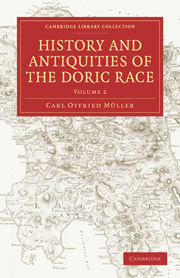Book contents
- Frontmatter
- Contents
- Map
- BOOK III POLITICAL INSTITUTIONS OF THE DORIANS
- CHAP. I
- CHAP. II
- CHAP. III
- CHAP. IV
- CHAP. V
- CHAP. VI
- CHAP. VII
- CHAP. VIII
- CHAP. IX
- CHAP. X
- CHAP. XI
- CHAP. XII
- BOOK IV DOMESTIC INSTITUTIONS, ARTS, AND LITERATURE OF THE DORIANS
- APPENDIX VI
- APPENDIX VII
- APPENDIX VIII
- APPENDIX IX
- Index of subjects
- Index of authors
- ADDITIONS AND CORRECTIONS
CHAP. IX
Published online by Cambridge University Press: 05 August 2011
- Frontmatter
- Contents
- Map
- BOOK III POLITICAL INSTITUTIONS OF THE DORIANS
- CHAP. I
- CHAP. II
- CHAP. III
- CHAP. IV
- CHAP. V
- CHAP. VI
- CHAP. VII
- CHAP. VIII
- CHAP. IX
- CHAP. X
- CHAP. XI
- CHAP. XII
- BOOK IV DOMESTIC INSTITUTIONS, ARTS, AND LITERATURE OF THE DORIANS
- APPENDIX VI
- APPENDIX VII
- APPENDIX VIII
- APPENDIX IX
- Index of subjects
- Index of authors
- ADDITIONS AND CORRECTIONS
Summary
On the changes in the constitutions of Argos, Epidaurus, Ægina, Cos, Rhodes, Corinth, Corcyra, Ambracia, Leucadia, Epidamnus, Apollonia, Syracuse, Gela, Agrigentum, Sicyon, Phlius, Megara, Byzantium, Chalcedon, Heraclea Pontica, Cnidos, Melos, Thera, Cyrene, Tarentum, Heraclea Sciritis, Crotona, and Delphi.
1. It is my intention in the present chapter to collect and arrange the various accounts respecting the alterations in the constitution of those Doric states, which deviated more from their original condition than Crete and Sparta: having been more affected by the general revolutions of the Greek governments, and drawn with greater violence into the strong current of political change.
And first, with regard to Argos, I will extract the following particulars from former parts of this work. There were in this state three classes of persons; the inhabitants of the city, who were for the most part Dorians, distributed into four tribes; a class of Periœci, and also a class of bondslaves, named gymnesii. The kings, who were at first of the Heraclide family, and afterwards of another dynasty, reigned until the time of the Persian war; there were also officers named artynæ, and a senate possessing extensive powers. All these are traces which seem to prove a considerable resemblance between the constitutions of Argos and Sparta, at least they shew that there was no essential difference.
- Type
- Chapter
- Information
- History and Antiquities of the Doric Race , pp. 146 - 198Publisher: Cambridge University PressPrint publication year: 2010First published in: 1830



